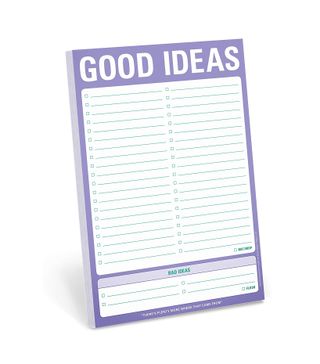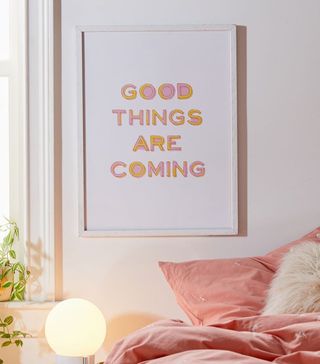If You Haven't Checked in on Your Habits Lately, Here's Why You Should

When was the last time you took a look at your habits? If you're like me, the answer is probably too long ago or never. They're called habits for a reason, right? You do them every day, or at least frequently. And sometimes you do them without even giving them a second thought—kind of like you're on autopilot.
But it helps to check on your habits and rituals from time to time to see if they're actually serving you, or if you're just doing them because you've been doing them for a while. "Our lives are governed by our habits. Habits and rituals are dependent on our goals (or a lack thereof); whether the nature of the goal is physical, professional, spiritual, etc.," says Nayera Elsayed, MHC-LP, a mental health counselor at Humantold. "Consistent goal setting is something I deeply care to integrate into my life. No matter how big/small they are, our goals are likely to change every week, and when they do, we should check in with ourselves by reviewing our habits and rituals."

Janay Bailey, MHC-LP, a mental health counselor at Humantold, says that reviewing your habits regularly reinforces behaviors and makes you more likely to continue the habits for days to come (if they're helping, of course). "It is easy to feel as though you are not making progress, so reviewing your habits provides proof of your hard work and reminds you of how far you have come," she says.
As for how often you should be checking them, or what "regularly," means, it's up to you to see what is most helpful—you could start with a weekly check-in for something that is a lower lift. But psychology expert Cheyenne Bryant, PhD, suggests reviewing your habits and rituals daily and measuring the result of your internal work part of your daily lifestyle. "Checking in daily will enable you to get ahead of what is working and what is not resulting in faster outcomes and incomes," she says. "What is working you keep. What isn't working get rid of and replace it with new habits and rituals that will create what you want. Don't forget to measure those daily as well."
So are you ready to review your habits and rituals? I asked the experts for some tips on getting started and here's what they had to say.
How to Review Your Habits
1. Take a Mindful Approach

"As you're reviewing your habits, it is important to take a mindful approach," Bailey says. "Be in the present moment as you are reviewing. Engage with your five senses. Notice how you feel in various parts of your body and pay attention to the thoughts you have. You can spend time journaling as you review."
2. Look at Your Progress

Elsayed recommends keeping on an eye on your progress as you do your review, which can help you decide what the next course of action will be for your habit. So, if the habit is helping you reach your goals, it's a sign that it's a keeper.
3. Assess the Sustainability of the Habit

Can you keep this habit or ritual up for the long-term if it's good for you? "Habits constitute life changes. Minor changes are easier to sustain," Elsayed says.
4. Look Even More Inward

"Examine the level of trust, and the relationship that you have with yourself to execute the guidelines of this habit," Elsayed recommends. "Remember, negative self-talk manifests itself. If you think/speak poorly of yourself, it will become difficult to make the necessary changes."
5. Ask Yourself These Questions

While you're taking stock of your habits, there are a few questions you can ask yourself to see if they're helpful to your life and goals, or if they're not moving you forward at all. The experts gave these prompts to try:
How do I feel when I am engaging in this habit?
How do I feel after completing the habit?
Is this habit adding a sense of purpose to my life?
Is this gaining me my desired result?
Do I like the result that my habits are creating?
Does this habit have a positive effect on the people around me?
Will the longevity of sustaining this habit serve a purpose in my life?
If I stopped implementing this habit into my daily routine, how could it affect me?
How can I continue to incorporate this habit into my life in a deeper and more meaningful way?
Does the overall engagement of this habit make me feel fulfilled?
With my present habit, what is working for me right now? What is not?
Does implementing this habit/ritual into my daily routine fit into my schedule, or is it too time-consuming?
Signs Your Habits Are Working

When you're doing your review, you'll be able to tell if a habit is good for you from a few signs. The biggest one is that you feel joy, fulfillment, peace, and alignment while you're engaging in the habit and after you complete it. Positive habits usually bring about positive emotions, Bailey says.
Mindfulness is also a sign. "Mindfulness is a practice where we are connecting our mind, body, and spirit as we engage in the process of deepening our connection with ourselves," Elsayed explains. "If you find yourself in tune with all three of these amidst the enforcement of your habits, then you know that you are partaking in a habit that is good for you."
And Elsayed says you'll know a habit is good for you when: It brings you closer to the life you wish to lead; it becomes consistent, or "normalized," in your day-to-day; and that reflecting on the engagement and accomplishment of it brings you joy.
Signs Your Habits Aren't Working

If a habit or ritual doesn't feel right or "off," it's probably not a fit for you. Bryant says that one sign a habit is bad for you is that it drains you and/or you feel dread doing it. And Bailey adds that you'll be able to tell by other signs like "immediate negative consequences, such as thoughts that don't serve you, hurting people that are close to you, or emotions such as sadness, loneliness, or feeling unproductive."
Bad habits can also disrupt your daily life, too. Elsayed says not being able to sleep; refusing to maintain proper hygiene; you stop doing activities you like; or starting to sacrifice your self-care strategies could all be signs that certain habits need to go.
And another way to tell if a habit is bad? By checking your closest family and friends who might recognize that something is a bit off. "It is highly likely for the ones in your inner circle to recognize the mischief in your bad habit before you do," Elsayed says. "This is because the consistency in a bad habit can lead to familiarity, and that stage is far more challenging to identify alone."
How to Change Your Habits
Once you pinpoint the habits you want to change or improve on, it can feel empowering, but also a little daunting. "Changing your habits is one of the most essential skills you can master because it allows for you to be in complete control of your life, while also acquiring a set of skills needed to reshape it," Elsayed says. Here are some things to be mindful of when changing your habits, or creating new ones…
1. Explore Your Triggers

Bailey says the first step in changing your "unhealthy habits" is to explore your triggers. "For example, if you want to stop the behavior of excessively snacking after 9 p.m., you may want to explore what triggers you to overeat after 9 p.m. Exploring your triggers can help you create a plan," she explains.
2. Gain Awareness
Bryant suggests thinking about how you want to feel and what result you want. "Once this awareness is obtained start to implement habits that create exactly that," she says.
3. Ensure That You Have the Mental Capacity

"If you don't get enough sleep, you'll be weary and have little stamina to modify your habits," Elsayed says. "That's wonderful while you're excited about your new habit, but as soon as things become a little tough, you will abandon it because you lack the drive to push yourself through a little suffering. It's important to get enough sleep."
4. Change Your Environment

If it's possible, Bailey recommends changing your environment. "Being around certain friends or family members can trigger you to fall back into your unhealthy habits," she explains. "If possible, limit your time around these friends and family members. Lastly, rewarding yourself when you don't fall into a 'bad' habit can help you reinforce the habits you'd hope to acquire."
5. Engage in Positive Self-Talk
"We all have inner monologues that we unconsciously engage in. It is not always evident, because most of the time our self-talk goes undetected in the back of our brains. That's natural, but negative self-talk can completely derail the process of changing a habit," Elsayed says.
Changing and monitoring your thinking patterns can also help when you're forming new habits. Bailey explains that Cognitive behavioral therapy says that when we have a thought, this thought creates an emotion, and we respond with a behavior. And a habit is a behavior. "To change or create new habits we must challenge the way we think. One way we can challenge the way we think is by challenging our negative or irrational thoughts," she says. "A tip for challenging our irrational or negative thoughts may include asking ourselves questions such as, 'If I look at this situation positively, how is it different?' Another question that challenges our negative or irrational thoughts may be to ask ourselves, 'Is there sufficient evidence for my thoughts?' To create a new behavior or habit, we must be open to changing our reoccurring thought patterns."
6. Write Down Your Thoughts
If you're looking to create a new habit, Elsayed suggests jotting down all your thoughts: "Decide what it is that you want, believe you can have it, and write up a list of everything that it will take to get there."
7. Be Intentional With What You Consume

" I am not just talking about your food choices, although that is also an integral part of this process. This also includes the books you read, the music/podcasts you listen to, the conversations you partake in, etc.," Elsayed says.
And What to Do If Bad Habits Linger

It can be normal to revert or slip back into bad habits. If you've been doing them for so long and are used to them, they're probably hard to shake off. But if it happens, Bryant says you should take accountability, but don't judge or beat yourself up for it. "Remember to take it one day at a time, be easy on yourself, and be disciplined to your needs," she says. "After all, self-love is the most important act that needs to be practiced as you are the only person you will never depart from."
When it comes to accountability, it might help to have someone you can trust and confide in. "It's important that your accountability partner doesn't shame you but instead empowers you and encourages you to get back into the habits that serve you," Bailey says.

Elsayed also suggests taking some time to think about what triggered you into falling back into the habit. "Identifying the root to which the habit was initially birthed can make it easier to put a stop to it," she says. "Reflect deeply on the moment where you realized that it was a bad habit. Then, reflect on how you felt in that moment. Often, remembering the emotional, mental, and physical detriments behind that habit can be the very thing that can help us refrain from the continuum of it."
And let yourself shake it off once you do that work. Immediately jump back into your healthy rituals and habits, Bryant recommends.
Next: How to Quit Those Unhealthy Bad Habits Once and for All
Disclaimer
This article is provided for informational purposes only and is not intended to be used in the place of advice of your physician or other medical professionals. You should always consult with your doctor or healthcare provider first with any health-related questions.
Sarah is lifestyle writer and editor with over 10 years of experience covering health and wellness, interior design, food, beauty, and tech. Born and raised in Los Angeles, she attended New York University and lived in New York for 12 years before returning to L.A. in 2019.
In addition to her work on THE/THIRTY and Who What Wear, she held editor roles at Apartment Therapy, Real Simple, House Beautiful, Elle Decor, and The Bump (sister site of The Knot).
She has a passion for health and wellness, but she especially loves writing about mental health. Her self-care routine consists of five things: a good workout, “me” time on the regular, an intriguing book/podcast/playlist to unwind after a long day, naps, and decorating her home.




